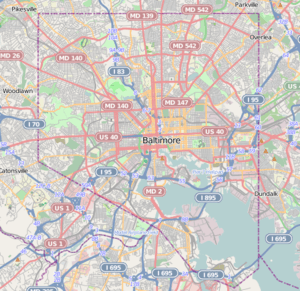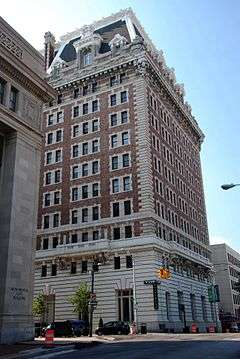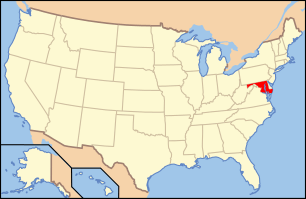Belvedere Hotel
|
The Belvedere | |
|
Belvedere Condominiums, July 2005, (former Hotel Belvedere) | |
   | |
| Location | 1 East Chase Street, (off North Charles Street), Baltimore, Maryland |
|---|---|
| Coordinates | 39°18′8″N 76°36′58″W / 39.30222°N 76.61611°WCoordinates: 39°18′8″N 76°36′58″W / 39.30222°N 76.61611°W |
| Area | 0.1 acres (0.040 ha) |
| Built | 1902-1903 |
| Architect | Parker & Thomas; W.A. & E.A. Wells |
| Architectural style | Beaux Arts |
| NRHP Reference # | [1] |
| Added to NRHP | August 29, 1977 |
The Belvedere is a Beaux Arts style building in Baltimore, Maryland. Designed by the Boston architectural firm of Thomas and Parker and built in 1902-1903, the Belvedere is a Baltimore landmark at the southeast corner of North Charles Street, facing north on East Chase Street in the city's fashionable Mount Vernon-Belvedere-Mount Royal neighborhood. In 1991 it was converted into condominiums, though areas remain open to the public.
Design
The eleven-story tan brick building rises 118 feet (36 m) from a rusticated stone base to an elaborately-detailed "French Second Empire" styled crown with a traditional mansard roofline.[2]
Origin
The hotel is named for its site on the former "Belvidere" estate of American Revolutionary War military leader/hero, a later civic and city leader, Colonel John Eager Howard, (1752-1827), of the famous "Maryland Line" regiment of the Continental Army which distinguished itself especially at the Battle of Long Island/Battle of Brooklyn outside New York in August 1776 and the Battle of Cowpens in South Carolina in 1780. Howard's lands north and west of old Baltimore Town, known as "Howard's Woods" were eventually used to donate plots for several churches and civic sites including the landmark Washington Monument and the four park-like squares surrounding it, when constructed 1815-1827, along with the old Baltimore Cathedral (now the Basilica of the National Shrine of the Assumption of the Blessed Virgin Mary), built 1806-1821, by the famed British-American architect, Benjamin Henry Latrobe, (1764-1820), a few blocks southwest on Cathedral Street. Later Howard children and members of the family sub-divided the grand estate beginning in the late 1820s into the 1830s and 1840s for rows of elegant townhouses (and later cultural institutions) extending northward from the harbor-front city, eventually surrounding the old historic mansion situated at the intersection of North Calvert and East Chase Streets until it too was finally razed in the mid 1870s.
Hotel history
The H.B. partners retained the architectural firm of Parker and Thomas of Baltimore and Boston, and the construction firm of W. W. and E. A. Wells of Chicago. Parker and Thomas had also been in the process of designing the new Homewood campus in the northern section of the city along North Charles Street above 30th Street of red brick and white wood trimmed Georgian architecture/Federal-styled architecture at The Johns Hopkins University when it relocated from its original previous downtown site along North Howard and West Centre, Little Ross and West Monument Streets around the same time and continuing for a few decades later.
When it was completed, the Belvedere, according to early accounts was considered "something of a sensation for Baltimore." Over the years, it has figured prominently in Baltimore's social, political and economic life, especially as it was located in a predominately tony exclusive residential neighborhood, north of most of the other downtown hotels which were then clustered . In 1912, former President of Princeton University and now Governor of New Jersey, Woodrow Wilson, once a graduate student at the newly established The Johns Hopkins University (1876) in the 1880s, living at nearby Druid Hill Avenue, stayed at the Belvedere Hotel while attending the 1912 Democratic National Convention, sited in Baltimore at the old Fifth Regiment Armory on North Howard Street nearby. That summer of 1912 convention nominated him for President versus incumbent Republican 27th President William Howard Taft and former 26th President Theodore Roosevelt in a landmark U.S. Presidential Election of 1912, resulting in Democrat Wilson's election as 28th President, the first Democrat since 22nd and 24th President Grover Cleveland in the 1880s and early 1890s.
The Hotel Belvedere was known as the premier lodging in Baltimore during the first half of the twentieth century, hosting American Presidents Theodore Roosevelt, John F. Kennedy and Woodrow Wilson, among others, along with such celebrities as Wallis Warfield Simpson (the Duchess of Windsor), (controversial wife, born and raised in Baltimore, of abdicated King Edward VIII of Great Britain in 1936-1937), General of the Army Douglas MacArthur, actor Clark Gable, and many dozens of others.[3]
Sheraton Hotels, a nationwide syndicate/chain purchased the hotel in 1946 and operated it until 1968 as the "Sheraton-Belvedere Hotel".[4]
Conversion
Former owner Victor Frenkil received numerous city loans before selling the hotel in bankruptcy court for 5.5 million in 1990.[5]
The Belvedere was converted to condominiums in 1991, although the building's historic, distinctive grand interior spaces of the ballrooms, restaurants (such as the "John Eager Howard Room" with its large grand murals of pastoral Baltimore scenery, and the "Owl Bar"), and lounges (including the modernistic night club/bistro, "The 13th Floor" and observation level, along with a basement-level shopping arcade) were cleaned, restored and enhanced, remaining open to the general passing public.
References
- ↑ National Park Service (2009-03-13). "National Register Information System". National Register of Historic Places. National Park Service.
- ↑ Glenn Bristow and Coates Nelson (January 1977). "National Register of Historic Places Registration: Belvedere Hotel" (PDF). Maryland Historical Trust. Retrieved 2016-03-01.
- ↑ "The Belvedere: History". Belvedere Hotel. 2003. Archived from the original on 27 May 2009. Retrieved 2009-06-20.
- ↑ http://www.baltimorestyle.com/index.php/style/baltimore/baltimore_life_at_the_belvedere_jf12/
- ↑ Simon, Roger (October 12, 1990). "Belvedere's sale ended free ride for Victor Frenkil". The Baltimore Sun. Baltimore. Retrieved May 12, 2016.
External links
![]() Media related to Belvedere Hotel at Wikimedia Commons
Media related to Belvedere Hotel at Wikimedia Commons


